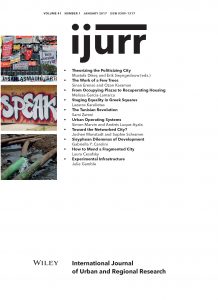Bicycling infrastructure has flourished across Latin American cities as urban activists who cycle have pressed municipalities to grant space on the streets. This article analyzes the ways urban cyclists use and create bicycling infrastructure in the city of Quito, Ecuador. It uses an ethnographic approach to understand how infrastructure is systematically produced through various relationships with human actors and non-human phenomena. The article starts from the perspective of the ethnographer moving within the assemblage of the feminist bicycle collective Carishina en Bici. The ethnographer drew on feminist science and technology studies (STS) approaches to cultivate everyday relationships of ‘care’ to become a moving part of an infrastructural assemblage. The study of infrastructure entails carefully choosing research relationships that result in intra-action, or the coming together of the subjects and objects of a study to produce infrastructure. The article uses the term experimental infrastructure to reveal the procedures of studying and analyzing the political dynamics that result from bicycling infrastructure. It draws on 15 months of fieldwork in Quito, Ecuador, and participatory photo travel diaries of cyclists to demonstrate how bicycling infrastructure is a point of intersection as well as an active site for making democratic claims to the Andean city.

